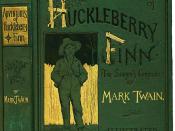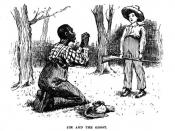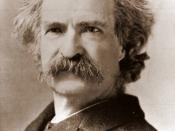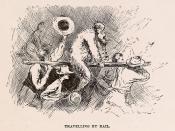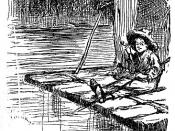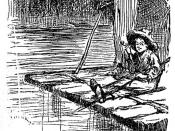In Mark Twain's "The Adventures of Huckleberry Finn" the Mississippi river serves as a constant in an otherwise scattered narrative. As Huck recounts his adventures, the story moves us, literally, down the river through the heart of the American continent, and through the heart of Huck himself, as he develops in life. The first mention of the river comes in Chapter 2, when Huck calls the river "grand" (252). This characterization of the river as a larger than life figure is indicative of things to come. The river is central in the physical journey of course, but also becomes indicative of Huck's spiritual journey as well.
As the book begins, the widow Douglas and Miss Watson are teaching Huck about Christianity. Miss Watson deplores Huck's behavior, asking him, "...why don't you try to behave?" (249). She then tells him about heaven and hell, warning Huck, that within the context of her faith his behavior will lead him to eternal damnation.
Miss Watson describes heaven as "the good place" (249), saying that all "...a body would have to do there was to go around all day long with a harp and sing..." (249/250). Huck disagrees with Miss Watson as to what is desirable while living, so he concludes what Miss Watson desires in the after life would also be less than ideal.
The ideal Miss Watson is describing is an existence of pure leisure. If all one has to do is go around and sing, then one does not have to do anything else. Miss Watson's vision of heaven is one where a person is free from all the labors and responsibilities of everyday life. Huck consistently feels stifled by the responsibilities imposed on himself and others by society. First, he wants nothing to do with Miss Watson and the widow's efforts to "sivilize" him saying, "...it was rough living in the house all the time...when I couldn't stand it no longer, I lit out. ...and was free and satisfied." (249). By the time Huck's father returns to town though, he has begun to adjust to his life in the Widows' care saying, "I liked the old ways best, but I was getting so I liked the new ones, too, a little bit." (257). Pap is not pleased that Huck is living with the widow and getting an education. Huck is told to leave school, and after having been truant with regularity, he begins to attend with more regularity.
Huck is flexible, happy in the woods and learning to be happy amongst civilization. He is able to adapt to his situation and make the most of it. Being told what to do, having decisions imposed upon him, does not sit well with Huck though. He goes to school "...to spite Pap." (262). Huck soon finds himself in his father's custody, living a few miles up the river and forced into seclusion. There his living situation is opposite what it was under the widows care, brute and uncivilized. Huck though, adapts and says, "It was pretty good times up in the woods there, take it all around." (262) Only after he was "...all over welts" (262) from constant beating and being locked up for days does Huck decide to leave.
Huck leaves, and soon finds himself in the company of a runaway slave, Jim. The pair live on an island a few miles downstream from town. Huck and Jim quickly work to make a comfortable situation for themselves, and Huck says to Jim, "...this is nice. I wouldn't want to be nowhere else but here." (278). At this point Huck is free from the direct influence of either his Father, or Miss Watson and the widow Douglas. He is still bound by societal expectations though, and rejects these obligations as well, telling Jim that he won't turn him in for running away, "People would call me a low down Ab'litionist and despise me...but don't make no difference. I ain't going to tell..." (274).
Huck's living situation changes constantly. He is able to make the most out of each, finding a measure of happiness wherever he his. The constant throughout these changes, is an individualism, running through Huck's character like a river. That will not allow him to abide having his situation or feelings dictated by others. The Happiness he finds lies in those moments when he is free from imposed duty and responsibility, as in the good place that Miss Watson described.
Huck soon finds himself mixed up in a feud between the Grangerford and Sheperton clans. Taken in by the Grangerford's after coming ashore following an accident with the raft, Huck is kept in the company of Buck Grangerford, a boy his age. While out hunting with Buck one day, they are passed by a man on a horse. Buck yells at Huck to take cover. Once hidden, Buck takes aim and fires his rifle at the man on the horse, Harney Shepardson. Huck later asks what offense Harney had given Buck to warrant him taking shot at him, Buck answers none and explains to Huck about the feud between the two clans, "...it's on account of the feud...a feud is this way: A man has a quarrel with another man, and kills him; then that other man's brother kills him; ... -- and by and by everybody's killed off, and there ain't no more feud. But it's kind of slow, and takes a long time....It started thirty year ago..." (314). Buck thinks nothing of living in a state of warfare with the rival clan. He merely accepts it as how life is. Kill the Shepardsons, or be killed by the Shepardsons. For Buck and the rest of his clan there is no other possibility. When Huck questions the bravery of a Shepardson clan member who killed some of Buck's kin, Buck defends the honor of his enemy. In questioning his enemy, Huck questioned him, and his entire way of life. The feud escalates after Sophia Grangerford runs off to elope with Harney Shepardson. There are casualties on both sides, and Huck is witness to Buck's murder. Huck described the horror of the scene, saying, "I wished I hadn't ever come ashore that night to see such things. I ain't ever going to get shut of them -- lots of times I dream about them" (319). When Huck is told that Sophia and Harney have succeeded in their elopement though, Huck says, "...I was glad of that." (318). The violent death which befalls Buck is the end result of a life lived in accordance with the duties and responsibilities imposed by the world around him. The duties imposed by class and family led Buck to a death so horrific, it caused Huck to have nightmares about it for the rest of his life. Contrarily, Sophia and Harney rejected those same obligations that killed Buck and others; that rejection of externally imposed duties is the cause of Huck's happiness for the two. Huck finds not just happiness for himself during the moments of life when he is free, but also feels happiness for others when they find the same kind of freedom.
After escaping from the feud, Huck and Jim get back on their raft and continue their trip down the river. The river provides a safe haven for them. It provides them with food to eat and water to drink. The river provided Huck and Jim their raft. The river sweeps them from danger, but takes them to it as well, literally guiding their journey, inexorably south. The Mississippi is physical tool of the "preforeordestination"(315) Huck heard about at the Sunday sermon while staying with the Grangerfords. On the river, Huck also found the "brotherly love" (315) preached about in the very same sermon. While on the river, Huck forms a bond with Jim that is far closer than friendship. Huck and Jim's relationship is more that of a father and son than it is anything else. They are not bound by blood, only love. When Huck confronts his feelings about Jim he realizes this, "I...set there thinking -- thinking how good it was... and I see Jim before me all the time: in the day and in the night-time, sometimes moonlight, sometimes storms, and we a-floating along, talking and singing and laughing. But somehow I couldn't seem to strike no places to harden me against him, but only the other kind..." (379). Facing his feelings for Jim, Huck decides he would rather face eternal damnation than betray the man he grew to love during their trip. In Huck's world, this is gravest of offenses. He has been raised in a society where black slaves are less than human, and his obligation as a member of society is to maintain the system of slavery and turn Jim in. Another obligation has been imposed upon him and Huck stifles against this one as well.
Huck tells us how he feels about his living situation each time as it changes. Only once, does he make a stark comparison between any of them, "...there warn't no home like a raft, after all. Other places do seem so cramped up and smothery, but a raft don't. You feel mighty free and easy and comfortable on a raft." (320). On the raft; on the river, Huck is free from externally imposed obligations and responsibilities, just as one would be in heaven as Miss Watson described it. On the river, Huck found the brotherly love the Grangerford's preacher spoke of. In finding that love, Huck found within himself the courage to reject both the penultimate and ultimate implied duties of his society. First, that he should at all times maintain the system of slavery, and second, he should live his life with an eye towards the afterlife, seeking eternal salvation. Huck's spiritual journey is one in which he is seeking the freedom to form his own views of the world and to live in accordance with them. Huck finds these freedoms on the river. For Huck, the river is far more than a majestic piece of the natural landscape. For Huck, the river is heaven. It's the good place Miss Watson spoke of.
Works CitedTwain, Mark. Adventures of Huckleberry Finn (TOM SAWYER'S COMRADE) 1876. Anthologyof American Literature Ninth Edition. Ed. McMichael et al. Pearson Education, UpperSaddle River, NJ, 2007. 248-426 Print.
